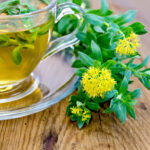by: November 30, 2024
 (NaturalHealth365) It’s official: “Burnout” – the feeling of being exhausted, frustrated, and overwhelmed in your life – is a real health problem that should not be ignored. So, today, we’ll show you how rhodiola can help – fast! For the first time, the World Health Organization has added “burnout syndrome” to its International Classification of Diseases – and some experts estimate that the condition may affect up to 70 percent of all working people. But when addressing burnout, Western medicine falls short (to say the least) – offering only limited treatment options and no acknowledged cure.
(NaturalHealth365) It’s official: “Burnout” – the feeling of being exhausted, frustrated, and overwhelmed in your life – is a real health problem that should not be ignored. So, today, we’ll show you how rhodiola can help – fast! For the first time, the World Health Organization has added “burnout syndrome” to its International Classification of Diseases – and some experts estimate that the condition may affect up to 70 percent of all working people. But when addressing burnout, Western medicine falls short (to say the least) – offering only limited treatment options and no acknowledged cure.
Fortunately, recent studies showcase the potential of the ancient Arctic herb rhodiola to act against stress and burnout. Reduced professional function, feelings of exhaustion, and a negative or cynical attitude toward the job are all indicators of burnout. Chronic workplace stress that hasn’t been properly managed is at the root of burnout – making stress reduction the first order of business in treating the condition. Research has shown that Rhodiola rosea preparations can effectively alleviate various aspects of stress-induced symptoms, offering promising clinical evidence for its benefits in managing burnout and related conditions.
Rhodiola rapidly improves symptoms of burnout – including depression and anxiety, study says
Rhodiola rosea, also known as golden root, has long been valued in traditional Asian and Ayurvedic healing systems for its effects against fatigue, lethargy, anxiety, and depression. But can rhodiola’s therapeutic effects be confirmed by scientific research? It turns out the answer is yes.
In an exploratory clinical trial published in Neuropsychiatric Diseases and Treatment, 68 participants were given 400 mg of rhodiola daily in divided amounts for three months.
At the beginning of the study, the researchers evaluated the subjects using language and sleep quality tests and the Burnout Screening Scale, which measures levels of sadness, tension, loss of interest, and guilt.
The effects of rhodiola were swift and profound. Simply put, people felt better.
The team noted that rhodiola boosted psychological well-being, promoted more restful sleep, and caused rapid, significant improvement in all measures of fatigue and burnout – including overall stress levels, fatigue, irritability, anxiety, and depression. Rhodiola also brought about a distinct improvement in high-level cognition and decision-making, promoting a calm, alert state of mind.
The researchers reported that improvements occurred during the first week and continued to increase throughout the study. Calling the results “encouraging,” the team urged further clinical trials of rhodiola.
Additional studies confirm that you can naturally reduce your stress symptoms with the help of herbal medicine
Human and animal studies alike have shown that rhodiola can improve symptoms of fatigue, enhance physical performance, reduce anxiety, sharpen cognition, and boost mood.
In a study published in Phytotherapy Research, 100 participants were given 200 mg of rhodiola extract twice daily for four weeks. The scientists noted that all tests showed “clinically relevant improvements” regarding stress symptoms, disability, functional impairment, and overall therapeutic effect.
The participants all reported some measure of relief from their symptoms of burnout and fatigue, and an astonishing 83 percent reported they were either “much improved” or “very much improved.” Note: Fatigue is generally defined as a feeling of tiredness – accompanied by lowered energy and motivation – that is not caused by lack of sleep and is not relieved by rest.
Remarkably, rhodiola acted quickly – with notable improvement of burnout symptoms occurring within three days. No adverse effects were reported, leading the team to conclude that rhodiola was both safe and effective in improving life-stress symptoms.
Herbal medicine proves to have a positive effect on free radicals and inflammation
Natural healers have long recognized rhodiola as an adaptogen that helps the body cope with and adapt to physical, psychological, and oxidative stress. Of course, ashwaganda and Siberian ginseng are two other examples of adaptogens.
Rhodiola helps to regulate and balance amounts of cortisol (the “stress” hormone) while increasing levels of a stress-resisting protein called Hsp70. In addition, rhodiola extracts contain rosavin and rosarin – a pair of polyphenols unique to rhodiola with powerful antioxidant and anti-inflammatory capabilities.
Finally, rhodiola increases the synthesis of ATP – vital to cellular energy – while promoting the activity of mood-stabilizing neurotransmitters such as serotonin and dopamine.
How and why should I take Rhodiola?
Forward-thinking holistic doctors are increasingly advising rhodiola for adrenal fatigue, chronic fatigue syndrome, ADD, ADHD, and depression. Rhodiola, which has fat-burning effects, is also sometimes advised to support weight loss and reduce unhealthy abdominal fat.
As a supplement, it’s available in tablets and capsule form. Holistic healthcare providers may advise taking 400 mg daily in divided amounts, with 200 mg 15 minutes before breakfast and another 200 mg 15 minutes before lunch.
Look for a formulation standardized to at least 3 percent rosavin. For maximum benefit, rhodiola should be taken with black pepper to promote absorption.
All of this is generally recognized as safe, but you should first discuss any change to your supplement routine with your doctor to ensure you’re heading in the right direction.
Simply put, rhodiola is a remarkable herb that can not only help banish symptoms of burnout but do so without the dangerous side effects and addiction risks that can accompany pharmaceutical anti-anxiety drugs. If you suffer from burnout syndrome, consider enlisting Rhodiola for some much-needed help.
Sources for this article include:
No hay comentarios:
Publicar un comentario